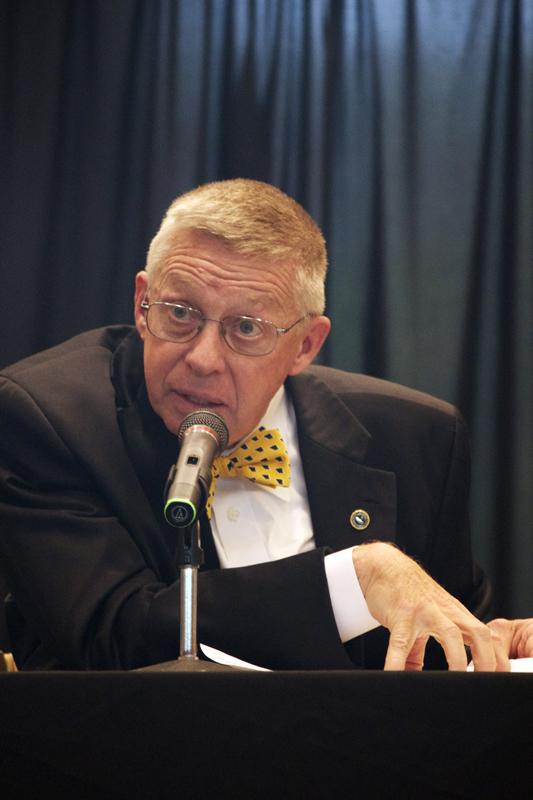
The Missouri Students Association and Associated Students of the University of Missouri hosted a rally against Missouri House Bill 253 on Thursday.
The Kill the Bill? rally featured a series of guest speakers, including UM System President Tim Wolfe; Chancellor Brady Deaton; MSA President Nick Droege; and Rep. John Wright, D-Columbia; Rep. Caleb Rowden, R-Columbia; and Rep. Chris Kelly, D-Columbia.
HB253, passed in May, was shot down in June by Gov. Jay Nixon, who cited concerns of fiscal irresponsibility. Nixon’s veto was contested by Missouri’s largely Republican legislature, which will attempt to [override that veto next week](https://www.themaneater.com/stories/2013/8/21/state-republicans-push-override-nixons-veto-tax-cu/).
HB253 would lower the maximum income tax for individuals and corporations — a decrease that could, Wolfe said, mean a net revenue loss for the UM System, which would translate into an 8 to 16 percent potential increase in tuition.
“I want to take a moment and walk you back in time to when you first arrived here on campus,” Wolfe said at the rally. “Like all college students, you had an expectation of a certain level of service. This is why you showed up. That’s what all colleges deserve and what all college students expect, but it comes at a cost.”
That cost, Wolfe pointed out, increases exponentially when the UM System loses its share of state revenue. He estimated that Missouri would lose about $800 million in total. Although he said agency budget cuts would likely be pro rata based on allocations, he painted a worst-case scenario in which the state slashed all $800 million from higher education.
“If that $800 million reduction, in general, was applied to all higher education, I would double your tuition immediately,” Wolfe said. “Who wants to do that? I don’t.”
Wolfe, a former IBM executive and a 30-year business veteran, said he knows the importance of tax incentives and a healthy tax infrastructure. HB253, he argued, provides neither.
“You have to consider all things about that environment when you decide to locate your business there or expand your footprint,” Wolfe said. “The long-term health of the state economy is directly tied to the quality of its workforce, and the quality of the workforce comes from investments we make in education.”
Deaton agreed, calling for the community to support Wolfe’s proposed balance between business incentive and quality of life.
“Clearly there is nothing more important to the quality of life in our state and in our broader society than the quality of higher education today,” Deaton said.
He touched on his experience in business and economics, but drifted later toward student political involvement.
“I want to urge you to stay engaged,” Deaton said. “Today it’s a tax issue and a potential override of a governor’s veto. Tomorrow it will be financial aid and other aspects of public policy that we want you to stay engaged in.”
Rowden, a Republican, also praised students’ engagement. Yet as an initial supporter of HB253 — though he said he has not decided how he will vote in the override— he sat alone between Wright and Kelly, Democrats who both vehemently opposed the legislation.
“I believe the equation is very simple,” Rowden said. “When the private sector in Missouri is performing well, and when it’s growing, education around the state will benefit.”
He bit back at Wolfe, whose projected tuition increase, Rowden said, was calculated only given that the federal Marketplace Fairness Act would pass — an unlikely scenario, he noted, thanks to strong congressional opposition to that legislation.